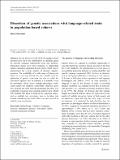Files in this item
Dissection of genetic associations with language-related traits in population-based cohorts
Item metadata
| dc.contributor.author | Paracchini, Silvia | |
| dc.date.accessioned | 2012-06-27T09:01:02Z | |
| dc.date.available | 2012-06-27T09:01:02Z | |
| dc.date.issued | 2011 | |
| dc.identifier.citation | Paracchini , S 2011 , ' Dissection of genetic associations with language-related traits in population-based cohorts ' , Journal of Neurodevelopmental Disorders , vol. 3 , no. 4 , pp. 365-373 . https://doi.org/10.1007/s11689-011-9091-6 | en |
| dc.identifier.issn | 1866-1947 | |
| dc.identifier.other | PURE: 13440152 | |
| dc.identifier.other | PURE UUID: 58e60f8c-8afc-4efc-9229-bb8970f0dbd6 | |
| dc.identifier.other | Scopus: 82755197778 | |
| dc.identifier.uri | https://hdl.handle.net/10023/2846 | |
| dc.description | The author was supported by the Wellcome Trust [076566/Z/05/Z]; [075491/Z/04] and the Medical Research Council [G0800523/86473]. | en |
| dc.description.abstract | Recent advances in the field of language-related disorders have led to the identification of candidate genes for specific language impairment (SLI) and dyslexia. Replication studies have been conducted in independent samples including population-based cohorts, which can be characterised for a large number of relevant cognitive measures. The availability of a wide range of phenotypes allows us to not only identify the most suitable traits for replication of genetic association but also to refine the associated cognitive trait. In addition, it is possible to test for pleiotropic effects across multiple phenotypes which could explain the extensive comorbidity observed across SLI, dyslexia and other neurodevelopmental disorders. The availability of genome-wide genotype data for such cohorts will facilitate this kind of analysis but important issues, such as multiple test corrections, have to be taken into account considering that small effect sizes are expected to underlie such associations. | |
| dc.language.iso | eng | |
| dc.relation.ispartof | Journal of Neurodevelopmental Disorders | en |
| dc.rights | (c) The Author 2011. This article is distributed under the terms of the Creative Commons Attribution Noncommercial License which permits any noncommercial use, distribution, and reproduction in any medium, provided the original author(s) and source are credited. | en |
| dc.subject | Epidemiology | en |
| dc.subject | Cognition | en |
| dc.subject | Language | en |
| dc.subject | Dyslexia | en |
| dc.subject | Quantitative genetics | en |
| dc.subject | Association studies | en |
| dc.subject | Neurodevelopmental disorders | en |
| dc.subject | QH426 Genetics | en |
| dc.subject.lcc | QH426 | en |
| dc.title | Dissection of genetic associations with language-related traits in population-based cohorts | en |
| dc.type | Journal item | en |
| dc.description.version | Publisher PDF | en |
| dc.contributor.institution | University of St Andrews. School of Medicine | en |
| dc.contributor.institution | University of St Andrews. Biomedical Sciences Research Complex | en |
| dc.identifier.doi | https://doi.org/10.1007/s11689-011-9091-6 | |
| dc.description.status | Peer reviewed | en |
| dc.identifier.url | http://ukpmc.ac.uk/abstract/MED/21894572 | en |
| dc.identifier.url | http://www.springerlink.com/content/31x472j82308458t/ | en |
This item appears in the following Collection(s)
Items in the St Andrews Research Repository are protected by copyright, with all rights reserved, unless otherwise indicated.

